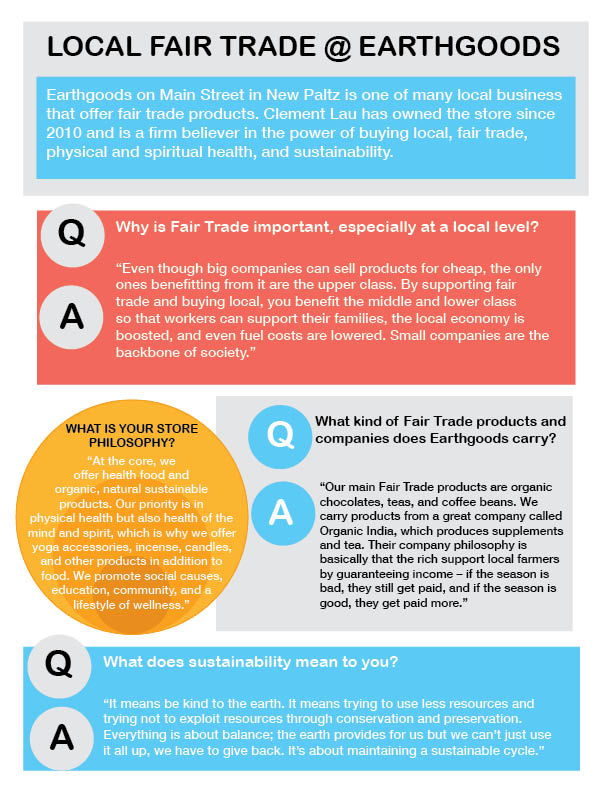If you often find yourself in the organic foods section of your local grocery store or if you shop or eat at the majority of places in New Paltz and the Hudson Valley, you have probably come across the term “fair trade”. Many people associate the term strictly with organic food, but it can apply to non organics as well. The fair trade label actually has more to do with food production than it does with the food itself. Workers’ rights and economic stability are among the priorities of fair trade companies.
According to the Fair Trade Definition and Principles, “Fair Trade is a trading partnership based on dialogue, transparency and respect that seeks greater equity in international trade. It contributes to sustainable development by offering better trading conditions to, and securing the rights of, marginalized producers and workers – especially in the South.”
By helping with financing and working to enforce labor laws, fair trade organizations aspire to create a healthy and safe working environment for producers and workers. On top of that, Fair Trade “actively encourages better environmental practices and the application of responsible methods of production.”
The idea of “sustainability” when associated with Fair Trade mainly refers to the organization’s commitment to protecting and preserving the environment based on specific standards and criteria. According to fairtrade.com, those include “protecting water resources and natural vegetation areas; promoting agricultural diversification, erosion control, and no slash an d burn; restricting the use of pesticides and fertilizers; banning use of genetically modified organisms (GMOs); and requiring proper management of waste, water and energy.” It’s important to respect the environment which provides the resources we need and consume, so Fair Trade makes it a top priority.
d burn; restricting the use of pesticides and fertilizers; banning use of genetically modified organisms (GMOs); and requiring proper management of waste, water and energy.” It’s important to respect the environment which provides the resources we need and consume, so Fair Trade makes it a top priority.
Fair Trade also places an emphasis on the health and well being of producers and workers. Beyond enforcing local labor laws, laws of production, child labor and child trafficking laws, “Fair Trade secures and improves workers rights by making a commitment to providing fair remuneration (not only legal minimum wage but living wage),” as outlined in their Definition and Principles.
The Fair Trade label can be found at health food stores as well as chain supermarkets. Fair Trade currently applies to a variety of products which can easily be identified by finding the Fair Trade Label. Some of the products that are certified globally under the Fair Trade label, according to fairtradeusa.org, include “coffee, tea and herbs, cocoa, fresh fruit and vegetables, sugar, beans and grains, flowers, nuts, oils and butters, honey and spices, wine and apparel, and certified ingredients are now used in ready-to-drink beverages, body care products and spirits.” They are also exploring certification in gold and precious metals, seafood and diamonds.
Fair Trade products can be found locally in New Paltz at a plethora of locations, including the Cafeteria, which offers Fair Trade organic coffee. Main Course and Earthgoods are among other stores and restaurants that offer Fair Trade certified products. Health and Nutrition offers information about Fair Trade and the products they offer through the Equal Exchange company on their website at http://www.newpaltzhealthandnutrition.com/.







